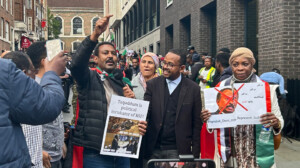Three unidentified victims of June 3 Khartoum massacre buried in Sudan
Three unidentified victims of the violent dismantling of the sit-in in front of the General Command of the Sudanese army in Khartoum on June 3, also known as the 29 Ramadan massacre, which caused the death of 127 people, were buried in anonymous graves in Khartoum on Wednesday.
 Three unidentified victims of the violent dismantling of the sit-in in front of the General Command of the Sudanese Army in Khartoum on June 3, were buried on Wednesday (RD)
Three unidentified victims of the violent dismantling of the sit-in in front of the General Command of the Sudanese Army in Khartoum on June 3, were buried on Wednesday (RD)
Three unidentified victims of the violent dismantling of the sit-in in front of the General Command of the Sudanese army in Khartoum on June 3, also known as the 29 Ramadan massacre, which caused the death of 127 people, were buried in anonymous graves in Khartoum on Wednesday.
Representatives of those killed during the December Revolution said in a statement that the bodies of the three people buried on Wednesday had been kept at the Bashayer mortuary in the capital Khartoum since the massacre, but have not been able to be identified.
The gathering of the families of the ‘Martyrs of the December Revolution’ continue to follow up the cause of those killed, and demand retribution for their blood.
The official death toll in the massacre stands at 127. About 700 protesters and others present at the sit-in that day were injured.
Between June 3 and July 18, another 16 people were killed during commemoration rallies and anti-junta protests.
On August 7, the Sudanese Professionals Association (SPA) Initiative for Missing People reported it documented more than 100 cases of people who went missing from the Khartoum sit-in on June 3. Prime Minister Abdallah Hamdok has formed a commission to investigate the violence used during the dismantling of the sit-in.
Tea sellers
In a press conference in Khartoum on Wednesday, the head and founder of the Tea and Food Vendors Association, Awadia Mahmoud – who received the 2016 US Secretary of State’s International Women of Courage Award – said that the women tea vendors who were working at the time of the break-up of the sit-in lost all of their money and tools. Six tea sellers went missing, and one of them returned “in a state of psychological disorder”.
She warned against the return of government campaigns targeting tea sellers in Khartoum state, and threatened to resort to other options.
She called on the Sudanese government to regulate the situation of these women. Mamoud herself became a roadside tea seller when her family moved to Khartoum, and has since been involved in promoting economic opportunities for women working in the informal sector.
There are more than 8,000 women engaged in selling tea and food, according to an inventory conducted in 2015.
“The women are in desperate need to practice their trade, especially in light of the deterioration of living conditions that forces them to sell tea in the markets and streets,” Mahmoud told Radio Dabanga in a previous interview.
Study
A study published in 2016 by economic expert Dr Hassan Abdelati found that 88.6 per cent of the tea sellers in Khartoum are either displaced or migrants from rural areas.
In the study, Dr Abdelati asserts that the tea sellers’ sector is growing because of inflation, war, difficult economic conditions, illiteracy, and poor education standards among the women.
Charges against Security General
On Wednesday, activists in Gadaref filed charges against the Director of the State Security Service, Brig Gen Abdulrahman El Haj on Wednesday, for allegedly killing, torturing and arresting people during the December uprising.
Activist Jaafar Khadr told Radio Dabanga that they filed the charges at the central police station in El Gedare. They have accused El Haj of killing 10 protesters in December, as well as arresting and torturing activists, confiscating their property, mobile phones and laptop computers without a warrant.
Jaafar explained that the opening of the communication at this time came is in anticipation of the imminent transfer of El Haj from the state due to an intelligence service decision.
Radio Dabanga’s editorial independence means that we can continue to provide factual updates about political developments to Sudanese and international actors, educate people about how to avoid outbreaks of infectious diseases, and provide a window to the world for those in all corners of Sudan. Support Radio Dabanga for as little as €2.50, the equivalent of a cup of coffee.












 and then
and then